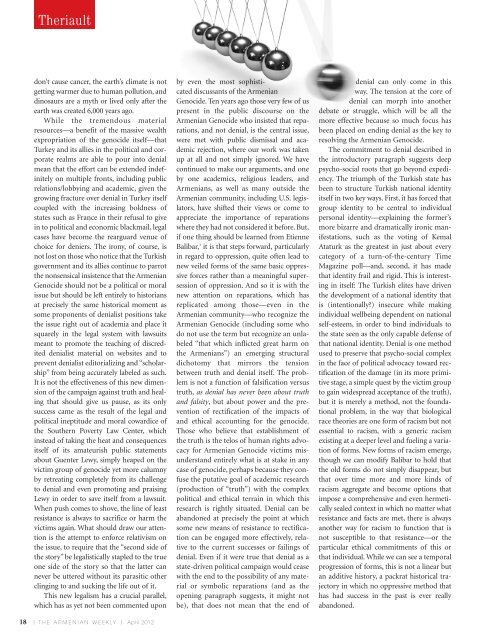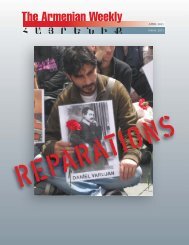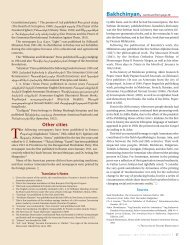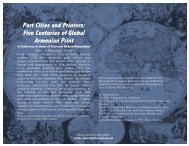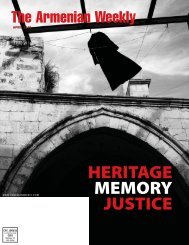Armenian Weekly April 2012 Magazine
Armenian Weekly April 2012 Magazine
Armenian Weekly April 2012 Magazine
You also want an ePaper? Increase the reach of your titles
YUMPU automatically turns print PDFs into web optimized ePapers that Google loves.
Theriault<br />
don’t cause cancer, the earth’s climate is not<br />
getting warmer due to human pollution, and<br />
dinosaurs are a myth or lived only after the<br />
earth was created 6,000 years ago.<br />
While the tremendous material<br />
resources—a benefit of the massive wealth<br />
expropriation of the genocide itself—that<br />
Turkey and its allies in the political and corporate<br />
realms are able to pour into denial<br />
mean that the effort can be extended indefinitely<br />
on multiple fronts, including public<br />
relations/lobbying and academic, given the<br />
growing fracture over denial in Turkey itself<br />
coupled with the increasing boldness of<br />
states such as France in their refusal to give<br />
in to political and economic blackmail, legal<br />
cases have become the rearguard venue of<br />
choice for deniers. The irony, of course, is<br />
not lost on those who notice that the Turkish<br />
government and its allies continue to parrot<br />
the nonsensical insistence that the <strong>Armenian</strong><br />
Genocide should not be a political or moral<br />
issue but should be left entirely to historians<br />
at precisely the same historical moment as<br />
some proponents of denialist positions take<br />
the issue right out of academia and place it<br />
squarely in the legal system with lawsuits<br />
meant to promote the teaching of discredited<br />
denialist material on websites and to<br />
prevent denialist editorializing and “scholarship”<br />
from being accurately labeled as such.<br />
It is not the effectiveness of this new dimension<br />
of the campaign against truth and healing<br />
that should give us pause, as its only<br />
success came as the result of the legal and<br />
political ineptitude and moral cowardice of<br />
the Southern Poverty Law Center, which<br />
instead of taking the heat and consequences<br />
itself of its amateurish public statements<br />
about Guenter Lewy, simply heaped on the<br />
victim group of genocide yet more calumny<br />
by retreating completely from its challenge<br />
to denial and even promoting and praising<br />
Lewy in order to save itself from a lawsuit.<br />
When push comes to shove, the line of least<br />
resistance is always to sacrifice or harm the<br />
victims again. What should draw our attention<br />
is the attempt to enforce relativism on<br />
the issue, to require that the “second side of<br />
the story” be legalistically stapled to the true<br />
one side of the story so that the latter can<br />
never be uttered without its parasitic other<br />
clinging to and sucking the life out of it.<br />
This new legalism has a crucial parallel,<br />
which has as yet not been commented upon<br />
by even the most sophisticated<br />
discussants of the <strong>Armenian</strong><br />
Genocide. Ten years ago those very few of us<br />
present in the public discourse on the<br />
<strong>Armenian</strong> Genocide who insisted that reparations,<br />
and not denial, is the central issue,<br />
were met with public dismissal and academic<br />
rejection, where our work was taken<br />
up at all and not simply ignored. We have<br />
continued to make our arguments, and one<br />
by one academics, religious leaders, and<br />
<strong>Armenian</strong>s, as well as many outside the<br />
<strong>Armenian</strong> community, including U.S. legislators,<br />
have shifted their views or come to<br />
appreciate the importance of reparations<br />
where they had not considered it before. But,<br />
if one thing should be learned from Etienne<br />
Balibar, 3 it is that steps forward, particularly<br />
in regard to oppression, quite often lead to<br />
new veiled forms of the same basic oppressive<br />
forces rather than a meaningful supersession<br />
of oppression. And so it is with the<br />
new attention on reparations, which has<br />
replicated among those—even in the<br />
<strong>Armenian</strong> community—who recognize the<br />
<strong>Armenian</strong> Genocide (including some who<br />
do not use the term but recognize an unlabeled<br />
“that which inflicted great harm on<br />
the <strong>Armenian</strong>s”) an emerging structural<br />
dichotomy that mirrors the tension<br />
between truth and denial itself. The problem<br />
is not a function of falsification versus<br />
truth, as denial has never been about truth<br />
and falsity, but about power and the prevention<br />
of rectification of the impacts of<br />
and ethical accounting for the genocide.<br />
Those who believe that establishment of<br />
the truth is the telos of human rights advocacy<br />
for <strong>Armenian</strong> Genocide victims misunderstand<br />
entirely what is at stake in any<br />
case of genocide, perhaps because they confuse<br />
the putative goal of academic research<br />
(production of “truth”) with the complex<br />
political and ethical terrain in which this<br />
research is rightly situated. Denial can be<br />
abandoned at precisely the point at which<br />
some new means of resistance to rectification<br />
can be engaged more effectively, relative<br />
to the current successes or failings of<br />
denial. Even if it were true that denial as a<br />
state-driven political campaign would cease<br />
with the end to the possibility of any material<br />
or symbolic reparations (and as the<br />
opening paragraph suggests, it might not<br />
be), that does not mean that the end of<br />
denial can only come in this<br />
way. The tension at the core of<br />
denial can morph into another<br />
debate or struggle, which will be all the<br />
more effective because so much focus has<br />
been placed on ending denial as the key to<br />
resolving the <strong>Armenian</strong> Genocide.<br />
The commitment to denial described in<br />
the introductory paragraph suggests deep<br />
psycho-social roots that go beyond expediency.<br />
The triumph of the Turkish state has<br />
been to structure Turkish national identity<br />
itself in two key ways. First, it has forced that<br />
group identity to be central to individual<br />
personal identity—explaining the former’s<br />
more bizarre and dramatically ironic manifestations,<br />
such as the voting of Kemal<br />
Ataturk as the greatest in just about every<br />
category of a turn-of-the-century Time<br />
<strong>Magazine</strong> poll—and, second, it has made<br />
that identity frail and rigid. This is interesting<br />
in itself: The Turkish elites have driven<br />
the development of a national identity that<br />
is (intentionally?) insecure while making<br />
individual wellbeing dependent on national<br />
self-esteem, in order to bind individuals to<br />
the state seen as the only capable defense of<br />
that national identity. Denial is one method<br />
used to preserve that psycho-social complex<br />
in the face of political advocacy toward rectification<br />
of the damage (in its more primitive<br />
stage, a simple quest by the victim group<br />
to gain widespread acceptance of the truth),<br />
but it is merely a method, not the foundational<br />
problem, in the way that biological<br />
race theories are one form of racism but not<br />
essential to racism, with a generic racism<br />
existing at a deeper level and fueling a variation<br />
of forms. New forms of racism emerge,<br />
though we can modify Balibar to hold that<br />
the old forms do not simply disappear, but<br />
that over time more and more kinds of<br />
racism aggregate and become options that<br />
impose a comprehensive and even hermetically<br />
sealed context in which no matter what<br />
resistance and facts are met, there is always<br />
another way for racism to function that is<br />
not susceptible to that resistance—or the<br />
particular ethical commitments of this or<br />
that individual. While we can see a temporal<br />
progression of forms, this is not a linear but<br />
an additive history, a packrat historical trajectory<br />
in which no oppressive method that<br />
has had success in the past is ever really<br />
abandoned.<br />
18<br />
| THE ARMENIAN WEEKLY | <strong>April</strong> <strong>2012</strong>


